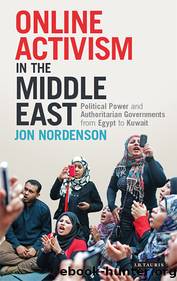Online Activism in the Middle East by Jon Nordenson

Author:Jon Nordenson [Nordenson, Jon]
Language: eng
Format: epub
Tags: Political Science, Public Policy, Science & Technology Policy, Social Science, Media Studies
ISBN: 9781786731265
Google: x-mKDwAAQBAJ
Publisher: Bloomsbury Publishing
Published: 2017-03-17T01:12:47+00:00
Large demonstrations were also covered in other outlets, both TV and newspapers, but the organisers almost always disagreed with the attendance figures given. However, the opposition also seems to have felt the need to provide their own coverage, particularly when the police started to crack down on protests in the autumn of 2012. In a country not used to police violence, it was important for the opposition to show the heavy-handed approach being used by the regime â the images of the attack on the dÄ«wÄniyya in December 2010 had proved to be a potent rallying call. Moreover, in the eyes of the opposition, this proved the illegitimacy of the regime's conduct, in a country that should be based on democracy and not force. Furthermore, there is no reason to doubt the opposition's genuine anger and contempt towards the violence used, not least following alleged attacks on female protesters during a demonstration on 19 December 2012. This last incident sparked a heated debate on Twitter, centered on the hashtag ضرب_بÙات_اÙÙÙÙت# ([the] hitting of Kuwait's women). A battle of blame was taking place as well, with media outlets close to the regime often referring to âelementsâ within demonstrations attacking the police, or castigating entire groups as villains, such as Karamat Watan. In the face of such allegations it is not difficult to see the need for documentation, not least of the fact that thousands of ordinary Kuwaitis took part. As we have seen, the videos uploaded by the groups themselves did not gain much attention and it was, by and large, clips published by other users which were used. The aforementioned blogger AlziadiQ8, often referred to as the online activistsâ own âminister of informationâ, was particularly important in this regard.
As for the differences between the groups studied, these seem to be related to the different motives for providing documentation. Unlike the others, Karamat Watan almost never provided pictures and videos. While this group was anxious to gain media attention, they were not concerned with showcasing their work. For one thing, they knew that they would gain massive media coverage if they were successful. Moreover, they were not interested in building an organisation and so did not need to compete for attention. Rather, they only needed the media to be aware of their events, and then to be successful in mobilising participants. Thus, they repeatedly contacted journalists and outlets directly ahead of the first march:
Kuwaitis call for #March_of_Dignity on Sunday 21-10-2012 @ap @reuters @afpfr @BBCWorld
@TWCable_NYC @cnn pic.twitter.com/P2WJQHaf
@KarametWatan, 20 October 2012
Download
This site does not store any files on its server. We only index and link to content provided by other sites. Please contact the content providers to delete copyright contents if any and email us, we'll remove relevant links or contents immediately.
Asking the Right Questions: A Guide to Critical Thinking by M. Neil Browne & Stuart M. Keeley(5762)
Autoboyography by Christina Lauren(5228)
Eat That Frog! by Brian Tracy(4526)
Dialogue by Robert McKee(4389)
Sticky Fingers by Joe Hagan(4188)
Journeys Out of the Body by Robert Monroe(3619)
Annapurna by Maurice Herzog(3464)
Full Circle by Michael Palin(3443)
Schaum's Quick Guide to Writing Great Short Stories by Margaret Lucke(3376)
Elements of Style 2017 by Richard De A'Morelli(3343)
The Art of Dramatic Writing: Its Basis in the Creative Interpretation of Human Motives by Egri Lajos(3062)
Atlas Obscura by Joshua Foer(2955)
Why I Write by George Orwell(2945)
The Fight by Norman Mailer(2930)
The Diviners by Libba Bray(2927)
In Patagonia by Bruce Chatwin(2922)
The Mental Game of Writing: How to Overcome Obstacles, Stay Creative and Productive, and Free Your Mind for Success by James Scott Bell(2904)
Venice by Jan Morris(2568)
The Elements of Style by William Strunk and E. B. White(2470)
